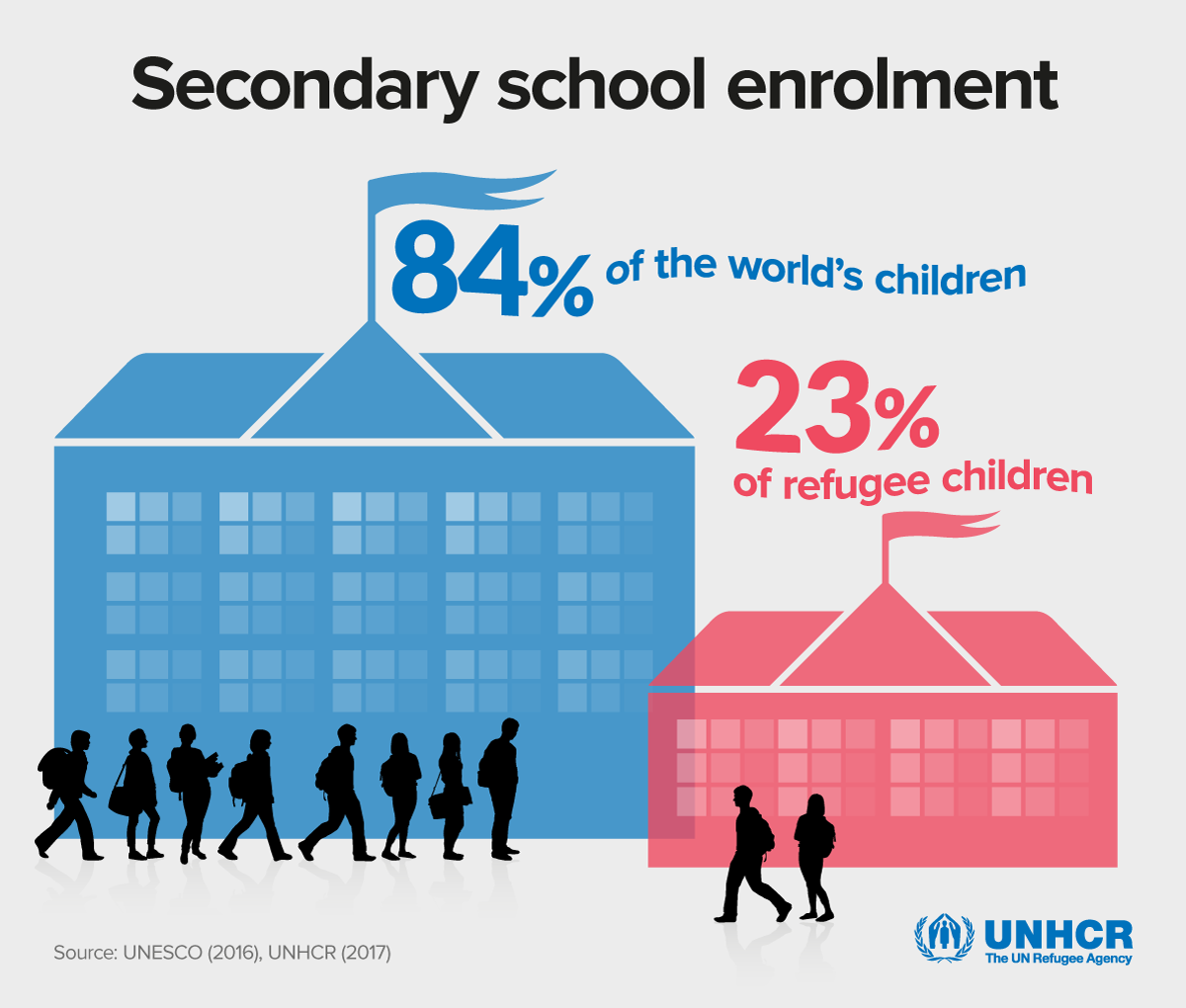Within the framework of an agreement reached between the UNHCR office in Cyprus and the KASA High School, KASA High School will offer a number of places to refugees and asylum-seekers who wish to obtain a high school leaving certificate. Students of 16 years or older with a good command […]

According to UNHCR's latest education report 'Turn the Tide' in 2017, 61 per cent of refugee children were enrolled in primary school, compared to 92 per cent globally. At secondary level the figure was 23 per cent, compared with a global rate of 84 per cent. This means nearly two thirds of refugee children who go to primary school do not make it to secondary school.
Within the framework of an agreement reached between the UNHCR office in Cyprus and the KASA High School, KASA High School will offer a number of places to refugees and asylum-seekers who wish to obtain a high school leaving certificate.
Students of 16 years or older with a good command of the English language will attend the programme, the duration of which is minimum three years of study, starting from September 2018.
The coming school year is divided in two semesters, starting on the 24th of September, 2018 and ending in the first week of June 2019.
For the implementation of the programme, the school kindly calls for volunteers to teach the below subjects. Classes will be taking place every week from 12:00 – 20:00 according to the day and time each volunteer can be available.
Interested individuals should contact Ms Maria Yiannoullou, Director of Student Affairs, KASA High School: [email protected]
Civic Orientation (2 periods* per week)
The course will be examining the ways culture and biology interact to form societies, norms, rituals and other representations of culture. Also, it will differentiate between the various meanings of culture within society and will discuss cultural universals in terms of the various elements of culture, such as norms and beliefs.
Social Anthropology – People and Culture (3 periods* per week)
It will provide an introduction to fundamental areas of inquiry in social anthropology. It will examine essential aspects of human social life from a cross-cultural perspective, which is one of the defining characteristics of anthropology. It will aim to show how anthropologists came to analyse human social life in the way they did, how this has changed over time, and how we can make use of this knowledge to inform the critical analysis of contemporary societies. We will explore the history of the discipline of anthropology, discuss important anthropological texts and examine how anthropologists have sought to understand key features of social life. It will explore how anthropology provides powerful perspectives on such things as exchange (gift-giving), language, thought, nature, friendship and gender as distinctly social phenomena. Examples used will cover a broad range of cultural contexts
Social Psychology (3 periods* per week)
The course is an exploration of the prevailing theories and empirical methods in the study of social psychology. The goal of this course is for the students to understand the ideas and methods that form the foundation of the field, and to apply these ideas during classroom or section discussion. Importantly—another main goal is to have fun. Social psychology is an exciting field. The quality of this course depends in large part upon the students’ level of engagement in the class or in section with their fellow students. Classes will include group discussion, as well as experiential exercises and debates.
The Psychology of Trauma (3 periods* per week)
This course explores the psychological impact of many different types of trauma, including military combat, accidents and life-threatening events, interpersonal violence, sexual assault, natural disasters, and childhood physical and sexual abuse. Our emphasis is on the psychological theories used to explain and treat symptoms associated with Post-traumatic Stress Disorder (PTSD). While discussing PTSD, we cover diagnostic methods, research on prevalence and policy issues, comorbid psychological and medical diagnoses, and social correlates. In addition to exploring the challenges associated with PTSD, we discuss mechanisms of positive change following a traumatic event, such as post-traumatic growth. Lectures on course topics are designed to be as interactive as possible by utilizing multimedia, in-class activities and small group discussions.
Victimology (2 periods* per week)
This course provides an introductory review of criminal victimization through a summary of the current theory, research and trends within the context of specific types of victimization. It includes an analysis of the characteristics of crime victims, victim reporting and non-reporting models, treatment of victims from different segments of the criminal justice system and victim assistance programs. History and theories of victimization are explored, with an applied victim-centred focus. Discussions of 21st century topics such as ethnic cleansing, massive trauma from criminal activity, and genocide also will be investigated.
Exposure to the various aspects of violence and victimization will offer students a working knowledge of the matters and actions related to this important aspect of modern times. At the conclusion of this course, the student should be familiar with the history, consequences, and the role of intervention and intermediation on violence and victimization.
Music
This course is specifically designed for the background and emotional needs of asylum-seekers and refugees. Thus, following the best practices established by Musicians Without Borders for introducing music to migrant communities, the course will serve both therapeutic and educational purposes.
The main therapeutic objective of the course is to provide an environment of emotional and physical safety in which the students will practice empathy, collaboration, and self-expression through participatory music-making activities
The main educational objectives of the course are to:
• develop the students’ applied musical aptitudes and abilities
• provide foundational knowledge of basic theoretical concepts
• expand the students’ awareness of a variety of musical repertories from around the world
• develop the students’ self-confidence and sense of social integration
Upon completion of this course, students will be able to:
*each period consists of 45 minutes
Μοιράσου το στο Facebook Μοιράσου το στο Twitter